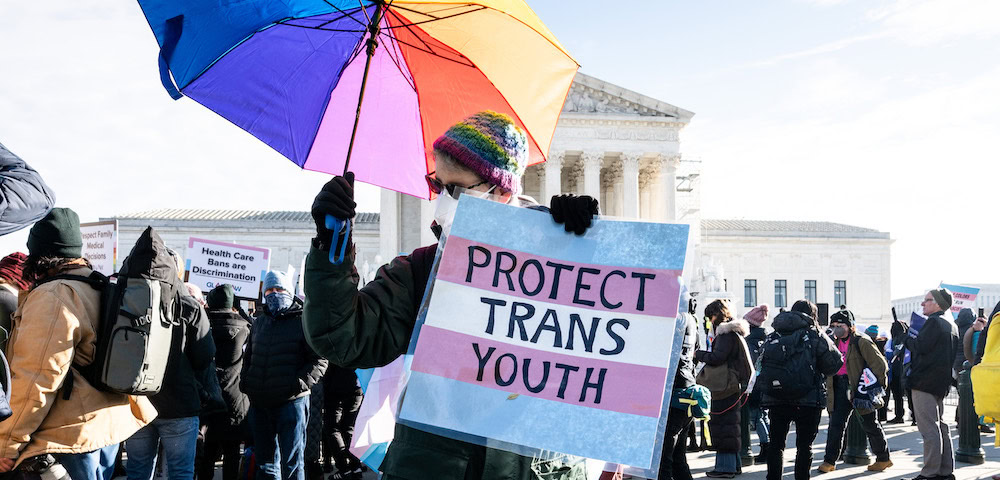
Everything You Need To Know About The Huge US Supreme Court Hearing On Trans Youth

Tennessee’s ban on gender-affirming care for trans children is currently being challenged in the Supreme Court, in a case that could have significant implications for the 26 American states that have passed similar laws.
This case, brought by families of trans kids against the state of Tennessee, is represented by Chase Strangio, the first trans attorney ever to argue before the Supreme Court.
During the hearing, the court appeared inclined to uphold Tennessee’s law, with conservative judges expressing scepticism towards the plaintiff’s arguments.
Trans advocates fear that if Tennessee’s law is upheld by the Supreme Court, it could further entrench other state-level restrictions and offer support to a federal law along the same lines.
A ruling is expected to be made in June.
Core arguments of the transgender youth Supreme Court hearing
Both sides of this argument claim they want to protect children from harm.
In a statement, Tennessee senator and co-sponsor of the law Jack Johnson said “Today marks a pivotal moment in Tennessee and our country’s history. The Supreme Court of the United States heard oral arguments for a first-of-its-kind case that shows every state in the country what it really looks like to stand up for children.”
However, the family at the centre of this case, who now have to travel to a different state to access healthcare for their trans daughter, said that “we and her doctors know is right for her.”
View this post on Instagram
Chase Strangio, the attorney acting for the family, stated “I am able to do my job because I have had this health care that transformed and, frankly, saved my life.”
Arrests after trans advocates stage sit-in in bathrooms
Parallel to the healthcare debate, the US Capitol has become a battleground over bathroom access.
Republican Representative Nancy Mace and Speaker Mike Johnson introduced a resolution mandating the use of single-sex facilities based on gender assigned at birth. This move has been widely viewed as targeting Delaware representative Sarah McBride, the first openly trans member of Congress.
In response to this proposed resolution, activists staged a sit-in and a dance party in the Capitol’s women’s bathrooms. 15 people were arrested, including Chelsea Manning, co-founder of the Gender Liberation Movement, an offshoot of the Women’s Liberation March.
View this post on Instagram
Sarah McBride, a trans woman, has stated she will comply with the restriction and use the men’s bathroom if the resolution takes effect.
The current cultural war against transgender people in the US
The Supreme Court hearing and Washington bathroom ban are only the most recent manifestations of anti-trans legislation, with more than 500 bills restricting the rights of LGBTQIA+ people introduced in states in 2024.
At least 24 states banned trans women and girls from competing alongside their peers in sports, while at least 11 have laws barring trans people from using the correct bathroom in schools and other government spaces.
Texas has introduced laws allowing people to sue healthcare professionals for providing gender-affirming care to minors and restrictions on LGBTQIA+ topics in schools. Florida has restricted adults from accessing gender-affirming healthcare.
Many of these laws have yet to make it through state legislatures or are caught up in legal challenges and appeal processes.
A similar bathroom ban was proposed in Montana to target trans woman lawmaker Zooey Zephyr, but failed. In a statement, Zephyr said “I’m happy to see that this proposed ban failed and am grateful for my colleagues – particularly my Republican colleagues – who recognised this as a distraction from the work we were elected to do.”
What will the Supreme Court ruling about trans youth and gender-affirming care actually mean?
The Supreme Court’s ruling on gender-affirming care could set a significant precedent, either by giving weight to a state’s ability to restrict its residents’ healthcare or by affirming the rights of trans youth to access medically necessary treatments.
Justice Brett Kavanaugh and Justice Amy Coney Barrett have both questioned whether this ruling would have wider impacts, especially on women’s sports. US Solicitor General Elizabeth Prelogar, arguing on behalf of the Biden administration, pointed out that the arguments in favour of Tennessee’s law could potentially also support nationwide restrictions. She stated that women’s sports were a separate issue.









